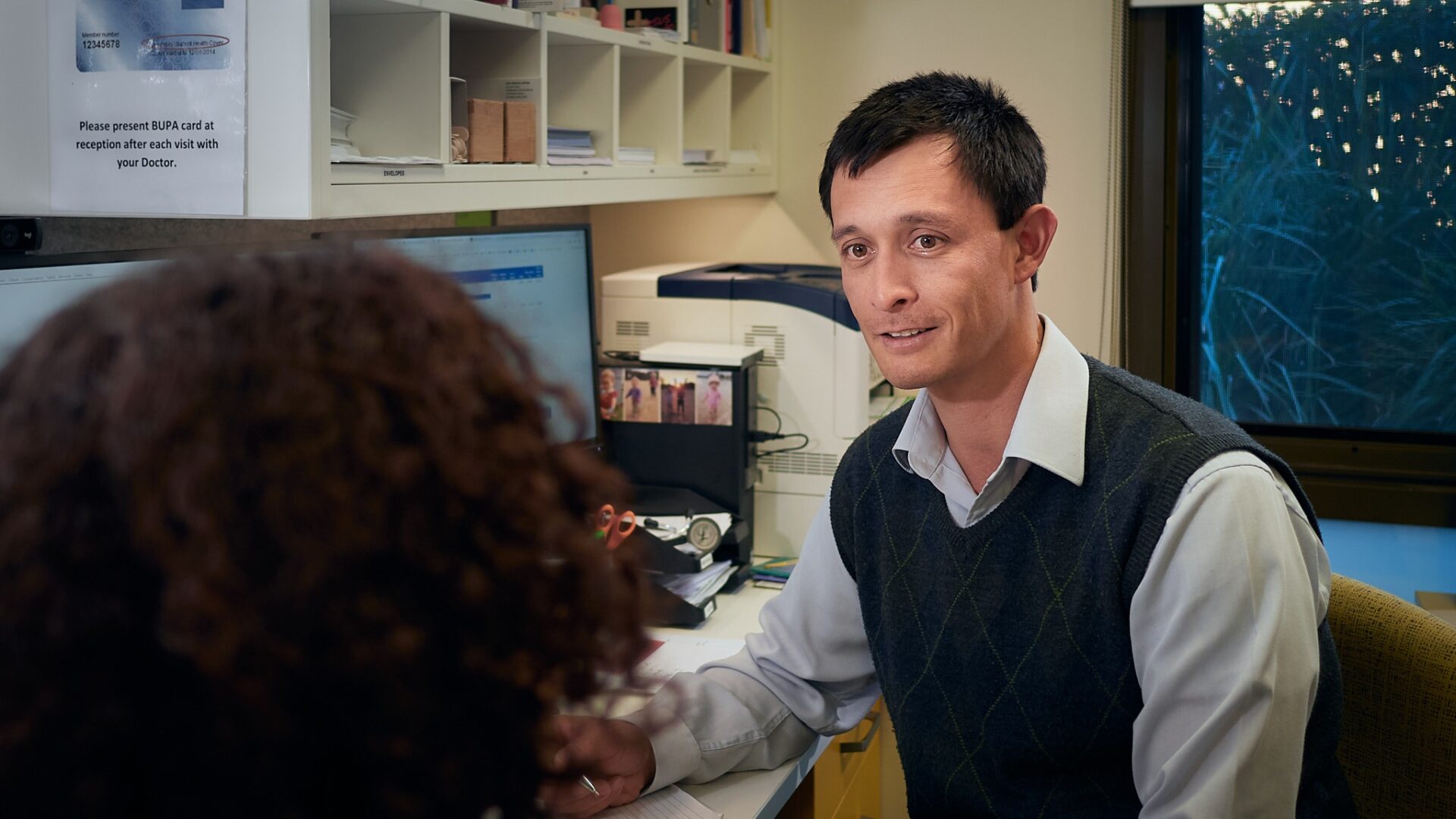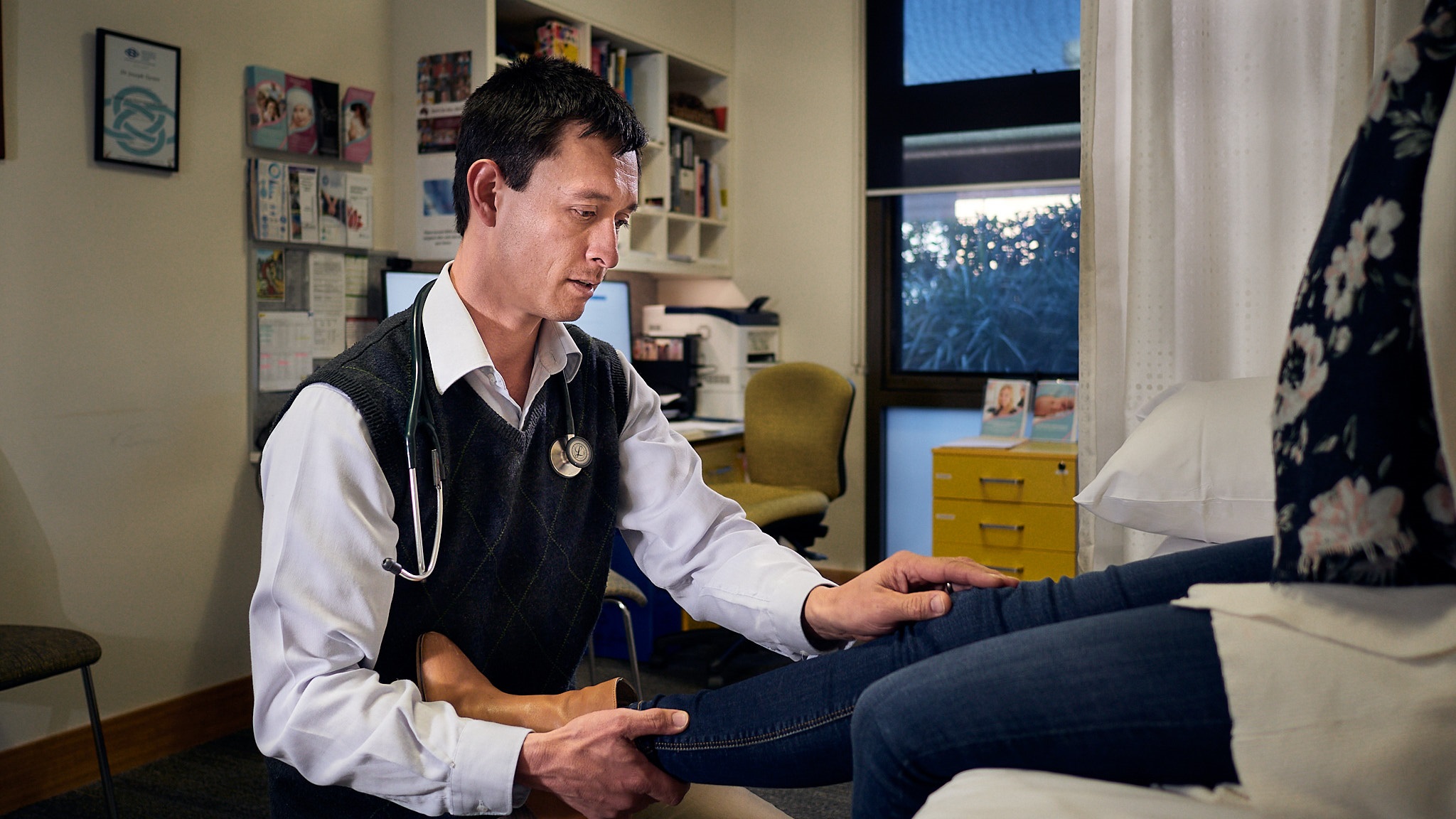
Interview with Dr Joe Turner, UNE Medical Centre
The UNE Medical Centre is a General Practice accredited by AGPAL. The surgery is owned by The University of New England, managed in collaboration with UNE Life, and operates with independent doctors. The Centre is available to the entire community and boasts state of the art facilities, offering a wide range of specialised services including advanced skin cancer management, women’s health & fertility services & their friendly staff.
Recently we sat down with Dr Joe Turner, MBBS, BMedSc(Hons), PhD, DRANZCOG(Adv), FACRRM, FARGP, FRACGP, to learn a little about his journey of becoming a doctor and a vital part of our community.
Tell us a little about you and how you decided to become a Doctor?
I was born and grew up in Armidale. I did OK at school academically and in sport, but was keen to see more of the world after finishing. I was told at school that I should do medicine but I had other interests. I got a scholarship to study Medical Science at the University of Syndey and majored in Anatomy in Pharmacology, followed by Honours in Pharmacology. I was then awarded a scholarship to do a Doctor of Philosophy (PhD) in Pharmacy to research the use of artificial intelligence in early drug development.
It was towards the end of this time that I felt that I was not necessarily working for the greater good. This was an important value my parents had instilled in me and when I took the time to think about it, it became clearer to me that I needed to strive to do that. I decided to turn down post-doctoral offers of research and teaching positions in the USA and New Zealand, and enrolled instead in the graduate medical program at the University of Queensland.
Can you please share a fond memory from your time studying?
I did the usual metropolitan medical student thing at the University of Queensland in Brisbane, spending clinical time at the Princess Alexandra and Prince Charles hospitals. But after becoming involved in the UQ Rural Health Club TROHPIQ (Towards Rural and Outback Health Professionals In Queensland), I moved to the Rural Clinical School in Toowoomba for the second half of my medical studies. The teaching and collegiate support were excellent, compounded by that Aussie lifestyle and perspective that is found outside metropolitan areas. Our TROHPIQ activities took us on tours out to Kingaroy and Stanthorpe, promotional sessions with local secondary schools, the annual national undergraduate rural health conference, and the premier event on the rural medical calendar: the Rural Doctors Association of Queensland (RDAQ) annual conference. There really was a buzz and passion about wanting to make a difference in rural Australia.
It was at one RDAQ conference that I met Dr Chester Wilson: the most memorable and unsung hero I have had the privilege to encounter. Chester was a GP Obstetrician, Anaesthetist, Emergency, Internal Medicine, Endoscopy, and Skin Cancer Clinician who had held together the healthcare of Charleville in remote South West Queensland for decades. He was also an accomplished musician, bush poet, computer technician, sound engineer, comedian, and an all-round good bloke. He graciously took me on as a GP registrar for two years and I am indebted to the clinical experience he gave me, and the twinkle he brought to my and everyone else’s lives.
I heard the phrase: “if you’ve seen one rural community, you’ve seen one rural community.” It stuck with me as I gained experience in many different rural communities and realised that they were all unique and had their own personalities, history, and future. I am fortunate to have spent medical student and doctor clinical time in places such as Jabiru and Nhulunbuy in the Northern Territory, Bourke, Charleville, Coffs Harbour, East Timor, Brunei, and Uganda. I have found that a person’s health is interconnected with their local and broader community, and that serving them needs to be done in that context.
What do you specialise in?
I have passed exams and been awarded Fellowships of the Royal College of General Practitioners (FRACGP), the Australian College of Rural and Remote Medicine (FACRRM), and a Fellowship of Advanced Rural General Practice (FARGP). I have also qualified as a Rural Generalist in Emergency Medicine as well as procedural Obstetrics including caesareans. Unfortunately, I am not currently doing deliveries since that was putting too much of a demand on my own young family. My other postgraduate training is in Skin Cancer Medicine, and Sexual & Reproductive Health. I have a passion for Restorative Reproductive Medicine, which is an approach in Women’s Health and Fertility that seeks to cooperate with and restore women’s hormonal and reproductive function.
I have undertaken Fertility Awareness and FEMM (Fertility Education and Medical Management) training in order to best manage Women’s Health and to provide comprehensive, personalised management of family planning and fertility issues.
You’re really interested in Women’s Health, can you tell us about this?
Women’s health is an area with a huge impact on personal and societal levels. Almost every woman will experience issues with her cycle, reproductive health, or other endocrine (hormonal) concerns from adolescence to menopause. This is often closely tied in with her mental wellbeing and social wellbeing. Yet research has found that only a small percentage of women are aware of their body’s own fertility signs. To compound this, research has also found that GPs receive little training and have low confidence in managing fertility and related endocrine issues in women. I feel that by providing an advanced primary care service in this field, I am helping to address this significant need.
What’s something most people wouldn’t know about you?
I worked as Lead Doctor on Survivor (USA) for two seasons, and am a founding Director of the Australasian Institute for Restorative Reproductive Medicine.
Wow, that’s impressive!
What’s something that makes you proud?
I have been privileged to have mentored students, junior doctors, and other health professionals who have been faced with difficult moral and bioethical workplace issues, and to have helped them navigate these often complex and emotive situations.

As a doctor, what sets you apart?
Evidence-based fertility awareness education to achieve or avoid pregnancy. Infertility workup and management including ovulation induction, from a Restorative Reproductive Medicine approach. Routine and complex antenatal pregnancy management, including the availability of bedside ultrasound. Christian ethical framework. University teaching, supervision of undergraduate through to PhD students, and current active research projects. Comprehensive and patient-centred model of care.
What do you enjoy most about being a doctor in a rural area?
Armidale has a wide breadth of personalities and health issues within the community. I get to help people on a personal level, the same people I mix with and pass down street. I can understand the issues they are facing because I am a part of their community. My local knowledge and contacts in health, education, and cultural spheres all come in to play when I see people at the medical centre.
What is your routine on a daily basis?
Nursing home or home visits first thing in the morning if required. I try and get refugees or people needing specialist telehealth appointments allocated times as a priority. For the rest of my day in the clinic, the General Practice is varied, and often there is so much more to be discussed than what the patient initially presents with. I do want to be able to offer quality and considered care.
My longer appointments during the day are for fertility and women’s health, pregnancy, mental health, chronic disease management, skin cancer management, and other minor procedures. I enjoy working with children and engaging with them to help deliver the best care for them and their families.
What attracted you to the UNE Medical Centre?
The UNE Medical Centre is family-friendly for the staff and for the patients. I am proud of the compliments about how friendly and supportive our Reception staff is, and how they make it feel personalised there. Another advantage is that we are often able to fit people in at short notice or within a couple of days. This allows a timely review of people who need to have a quick or soonish review appointment. Also, working at the UNE Medical Centre integrates well with my teaching and research interests.
If you can leave people with one message, what would it be?
Your body is there to help you, and needs you to help it! We (GPs) are here to give you the tools to work with your body and your mind, and to be a reference point for you to find trusted care, information, and coordination.
And finally, what’s your favourite thing about being a part of the New England community?
Coming back to Armidale after having completed my schooling here and then being away for 20 years felt like, for the first time, coming home. This place has it all: hockey, gymnastics, the Blue hole, the UNE, church, the town, and everything out of town.
Thank you so much for your time, Dr Turner, we’ve loved learning a little about you and your role at the Medical Centre!
If you’re looking for expert medical services, look no further than the UNE Medical Centre. Here to support UNE staff, students, as well as all residents of Armidale, & the wider community.
Please note that everyone entering the UNE Medical Practice from Wednesday 5th Aug will be required to wear a face mask. Our staff are wearing masks within 1.5m of patients. This decision is in line with the advice of NSW Health and the RACGP.
We thank you for your co-operation with this condition of entry
Conveniently located within the Tablelands Clinical School Building, on the grounds of Armidale Hospital.


